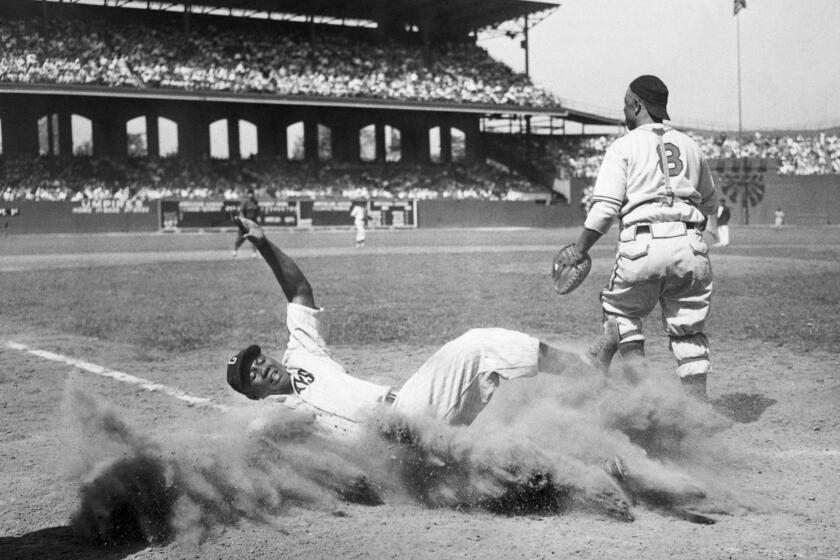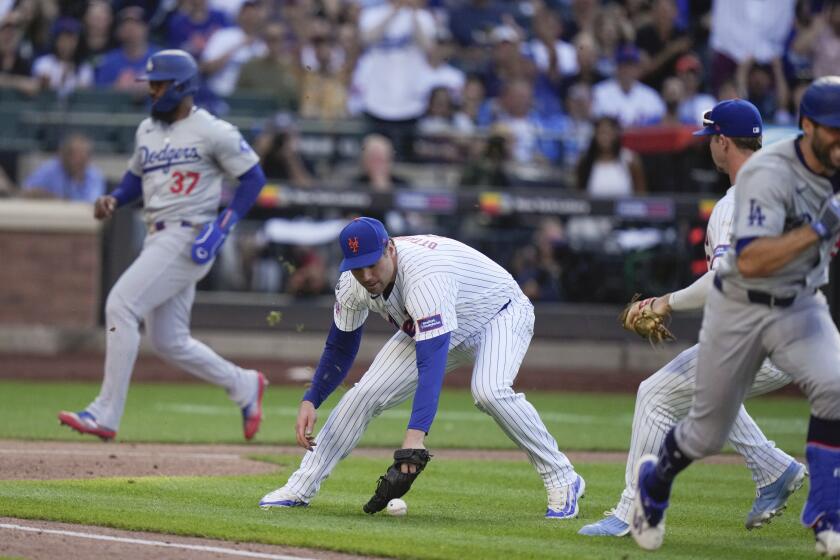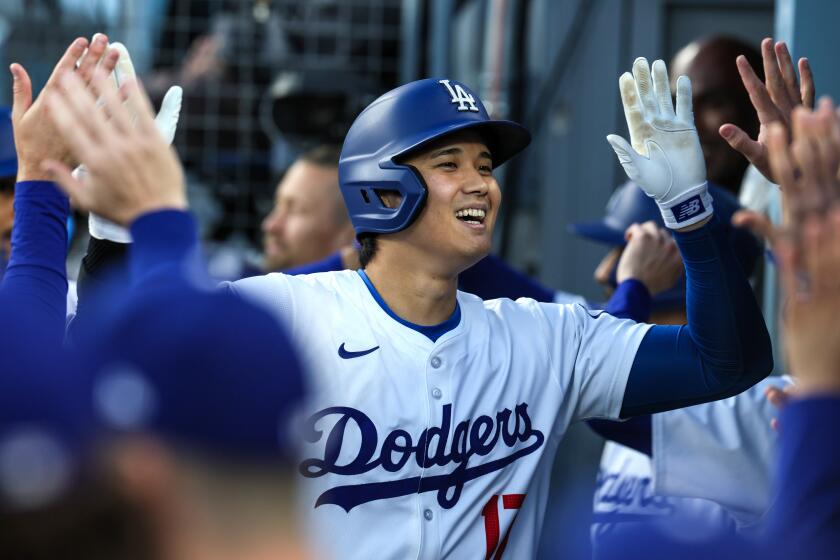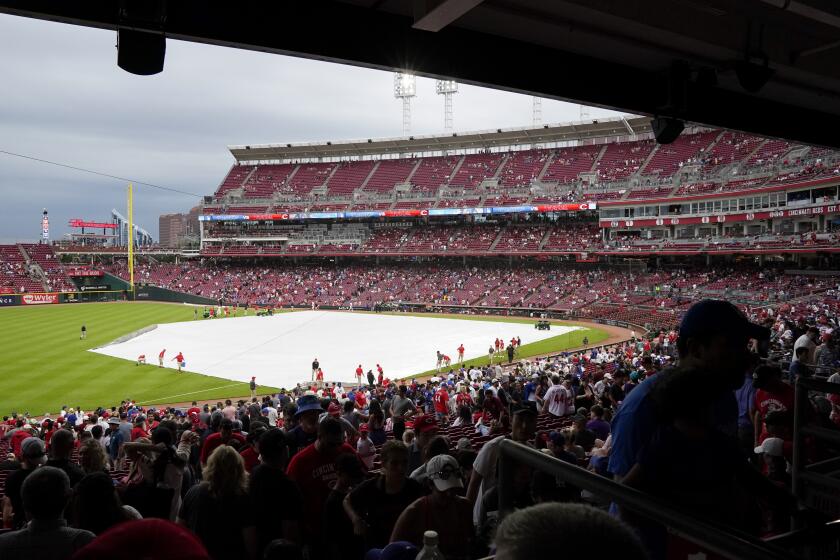Campanis Fired in Wake of Racial Remarks : O’Malley Changes His Mind, Asks for Resignation; Claire Takes Over Player Personnel Role
Al Campanis, the Dodgers’ vice president in charge of player personnel for 19 years and a member of the organization for 44 years, was fired Wednesday, two days after saying during a nationally televised interview that blacks did not have the “necessities” to be managers or front-office executives.
Owner Peter O’Malley said that, upon further reflection after a “good night’s sleep,” he had decided Wednesday morning to ask Campanis for his resignation.
O’Malley, who had said Tuesday night that Campanis’ job was “absolutely not” in jeopardy, said that after reflection, Campanis’ comments were too serious to ignore.
“The comments Al made Monday night . . . were so far removed and so distant from what I believe and what the organization believes that it was impossible for Al to continue the responsibilities that he’s had with us,” O’Malley said in a press conference before Wednesday’s Dodger game against the Houston Astros.
Fred Claire, the Dodgers’ executive vice president whose duties mostly have been administrative, will assume Campanis’ duties, O’Malley said. Among Campanis’ responsibilities were trades and other player moves.
O’Malley said that Campanis, 70, will not be given another job in the organization, and that Campanis will not be consulted on future player personnel decisions.
Asked if Claire will permanently assume Campanis’ job, O’Malley said: “For what duration, I cannot say. I don’t know.”
Claire has been with the club for 17 years, having joined the team in 1969 as director of publicity. Before that, he was a sports editor, columnist and baseball writer for the Long Beach Independent Press-Telegram, the Pomona Progress Bulletin and the Whittier News. He was appointed Dodger vice president in charge of public relations and promotions in 1975, and executive vice president in December of 1982.
There has long been speculation that Manager Tom Lasorda, 59, would take over as vice president of player personnel when Campanis eventually stepped down. The departure of Campanis further complicates the Dodgers’ front-office alignment. Last month, Bill Schweppe, the vice president of minor-league operations, announced his retirement, effective at the end of the season. A replacement has yet to be named. In a prepared statement, Claire said:
“I fully recognize the important task in assuming the responsibility of the director of player personnel department of the Dodgers. We are fortunate to have many talented people in scouting, minor league and major departments. We will call upon all of these members of the Dodger organization to help field the best team possible.”
O’Malley said that the strong reaction to Campanis’ remarks in Los Angeles from groups such as the NAACP and the Urban League had not prompted his decision to fire Campanis.
“Fortunately, I’ve been in Houston yesterday and today, so I haven’t read what comments are in the newspaper and to what extent protests might exist,” O’Malley said. “It was just, in my judgment, the appropriate, proper and right thing to do.”
Tuesday night, O’Malley and Campanis had issued apologies for Campanis’ remarks on ABC-TV’s “Nightline” program that was focusing on the 40th anniversary of Jackie Robinson’s breaking the baseball color barrier. That was also when O’Malley said flatly that Campanis would not lose his job over the incident.
Wednesday, O’Malley said: “That question was asked to me at about the fourth inning (of Tuesday’s game), and it was accurate at that time. Sometimes, a good night’s sleep will make you think more clearly. After a hectic day yesterday, I clearly think that it was the appropriate, proper and right thing to do.”
Campanis was unavailable for comment on Wednesday. O’Malley and Campanis left Houston on the same flight Wednesday afternoon and returned to Los Angeles.
O’Malley, Lasorda and some Dodger players referred to the firing as a sad day.
“I remember when I asked Al to be the vice president (in 1968), he said it was the happiest day of his career,” O’Malley said. “Yesterday and today, he said it was the saddest day of his career.
“I don’t believe that (Campanis’ comments on television) accurately reflect Al’s thoughts on the subject (of blacks in baseball). But nevertheless, what was said was said. . . . No one has advanced minorities more than Al. It goes back to hiring Jim Gilliam as a coach. That was Al’s suggestion. The hiring of Tommy Davis (as a batting instructor), that was Al’s suggestion. I could go on.”
Campanis’ comments seemed especially shocking because he had been part of Branch Rickey’s “great experiment” in 1946, when Jackie Robinson was signed to a minor-league contract. Campanis was the shortstop on the 1946 Montreal Royals, for which Robinson played second base.
The next season, when Robinson broke the color barrier with the Brooklyn Dodgers, Campanis retired as a player and managed in the minor leagues for three seasons. He became a Dodger scout in 1950 and was the club’s director of scouting from 1957 until assuming his role as vice president in 1968.
“Like I said, this is a very sad time,” O’Malley said.
Lasorda was emotional, sobbing at times. “It’s a shame, a crime,” he said. “I think of all the people he’s worked for and helped. He made one mistake. Why he said it, who knows. To see him go out this way . . .
“I hope and pray that the people of America can forgive a man who made one mistake and it cost him. . . . The good Lord forgave the people who crucified Him. This man is going to have to live with this for the rest of his life. It’s not the way it should have ended. The man should’ve gone out with style and class.”
Instead, on Campanis’ final day in the Dodger organization, he was criticized by black leaders in Los Angeles. The day before, several of his black players, too, had been critical of his comments.
Bill Madlock, the Dodgers’ veteran third baseman, had said Tuesday that he was disappointed by Campanis’ remarks but that they reflected the thinking of many in baseball.
Wednesday morning, after O’Malley had met with the players to inform them of Campanis’ dismissal, Madlock and other players said they were surprised by the move, especially since the club had issued the apology.
“I was shocked,” Madlock said. “Like I said, I didn’t like his statement about blacks, but I didn’t want his head. It’s sad to go out this way.”
Other player reactions:
--Outfielder Pedro Guerrero: “Right now, I think it’s a bad situation for him and us. I feel bad. I know he fought a lot for me. Probably if it wasn’t for him, I would’ve been somewhere else a long time ago.
“I know he didn’t mean to say that. . . . You know how he gets confused. Things happen. (But) I just can’t believe it happened.”
--Pitcher Orel Hershiser: “After statements like that, there aren’t many alternatives you can have. Whether or not he truly believes it, those comments were made and they are out there.
“We (the players) didn’t know the ramifications because we’re kind of in a shell on the road. We’re not in L.A., where the ramifications are felt. . . . I’ve gone through a lot with the Chief (Campanis’ nickname)--two arbitrations, making the club, having him think of me as a second son.”
--Infielder Dave Anderson, the Dodgers’ player representative: “You’ve got to feel Al going out like this is a tragedy. A lot of the guys are going to feel bad for the Chief, no matter how they felt about him before. . . . I don’t think the Chief has any prejudice in him. Maybe it was just a poor choice of words.”
--Outfielder Ken Landreaux: “I had an idea it might happen, considering he made those comments on national TV and everything. . . . Still, it was a shock today.”
Lasorda said that O’Malley had told him of the decision to dismiss Campanis early Wednesday morning, before meeting with the players. Lasorda said he had not spoken to Campanis after his firing, but had talked to him Tuesday night.
“Naturally, he was down,” Lasorda said. “He realized what had happened and that he made a big mistake. As we all know, (his comments) definitely were contrary to what the organization has always believed in.”
When O’Malley learned of Campanis’ comments on Tuesday, he requested a tape of the interview and watched it late Tuesday afternoon in the company of Campanis and Steve Brener, the Dodgers’ publicity director.
O’Malley said his initial response to Campanis’ interview, which included comments that blacks have to “pay their dues” in the minor leagues before becoming managers, that blacks might not have the background for the positions and also a reference to blacks’ supposed inability to swim, was disbelief.
“A lot of things went through my mind,” O’Malley said. “Disbelief was the dominant reaction. Many, many thoughts went through my mind.
“Like I have said, the comments Al made the night before stand on their own, in my opinion.”
Before releasing his written apology Tuesday night, Campanis apparently had been made aware of the magnitude of his words. When contacted by a Times reporter Tuesday morning, Campanis’ only comment was: “I’ve added enough already. There’s nothing I can do now.”
Ted Koppel, the host of “Nightline,” said that Don Newcombe, the Dodgers’ director of community relations, had been scheduled as the Dodgers’ representative on the show, which also included Roger Kahn, a former baseball writer and author of “The Boys of Summer,” a book about the 1955 Brooklyn Dodgers.
Newcombe, however, apparently missed his plane connections and had to cancel. Campanis was asked to substitute.
O’Malley was asked at the press conference what answers he would have given on “Nightline,” had he appeared instead of Campanis.
“First of all, I would have said that I’m not a spokesman for the industry,” O’Malley said. “Secondly, I would have said the Dodgers are doing all they can to have minorities in key positions.”
Henry Aaron, the all-time home run leader and the highest ranking black executive in baseball as a vice president with the Atlanta Braves, has criticized the Dodgers for not promoting blacks to high positions in the organization.
O’Malley said he did not know Campanis’ immediate plans but reiterated that Campanis is no longer affiliated with the Dodgers.
“I believe his plans are to take time off and relax,” O’Malley said. “(To) be with his family and close friends.”
More to Read
Are you a true-blue fan?
Get our Dodgers Dugout newsletter for insights, news and much more.
You may occasionally receive promotional content from the Los Angeles Times.






